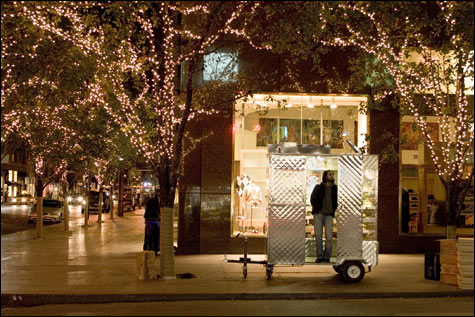
MAN PUSH CART: Neo-Realism without the saving grace of a game-show jackpot. |
Poverty is making a comeback, on the streets and on movie screens. Slumdog Millionaire won an Oscar and the hearts of millions with its upbeat, Dickensian version of desperate penury and picturesque squalor in Mumbai. But that was far away and for a mainstream audience.Back here in America, independent filmmakers have turned their minimalist lenses on the least among us (which might any day include all of us). Instead of indulging in the fantasies and anxieties of the middle class, they aspire to show the realities of the poor (or are these middle-class anxieties and fantasies about the poor?), using actual locations and employing local non-actors. In a long New York Times essay last month, A.O. Scott identified this new genre as "Neo–Neo Realism," and he placed at its head 34-year-old North Carolina filmmaker Ramin Bahrani. In the words of none other than Roger Ebert, Bahrani is "the new great American director."
Quite an achievement after only four features — three of which will be screening this weekend at the Harvard Film Archive, with the director in attendance. And the press plaudits are, so far, not entirely unwarranted. Bahrani's considerable talent and rigorous sensibility illuminate his MAN PUSH CART (2005; April 12 at 7 pm), which might well be his best. As part of the Neo-Realist tradition, it taps mostly into the pathos of Vittorio de Sica's The Bicycle Thief in its story of Ahmad (Ahmad Razvi), a young Pakistani man with a mysterious and evidently tragic past who pays for his sins by hauling a snack push cart pre-dawn each morning to the Calvary of his Manhattan street corner. Bahrani likes to show how things are done — lighting a gas stove, stacking up baked goods for display — and he likes to show them repeatedly, invoking both the fascination and the tedium of routine. Ahmad is offered opportunities to rise above his servitude: he adopts a stray kitten, he takes a liking to a pretty Spanish woman tending a nearby newsstand. But somehow it doesn't seem that a jackpot from a game show is in his future.
Benighted though he may be, Ahmad is pursuing that old chestnut, the American Dream, trying to earn enough to buy his own business and take up a normal family life. Alejandro (Alejandro Polanco), the pre-teen protagonist of CHOP SHOP (2007; April 12, following Man Push Cart), has similar ambitions. He hustles odd jobs, some illegal, from the rows of garages in the sublimely bleak Willets Point area in Queens, hoping to buy a canteen van (a step up from Ahmad's pushcart) and make enough money to keep his older, teenage sister off the streets.
Bahrani himself has compared Chop Shop with Los olvidados, though its compassion is in a different world from Buñuel's devastating entomological detachment. Bahrani's latest, GOODBYE SOLO (2008; April 11 at 7 pm), reminds me more of the Abbas Kiarostami of Taste of Cherry (without the reflexivity), if not the Mike Leigh of Happy-Go-Lucky. An irrepressibly optimistic Senegalese cabdriver (Souleymane Sy Savané) working in Bahrani's home town of Winston-Salem has made a contract with a crusty codger (Red West) who wants to be driven to lofty Blowing Rock on a particular date. Suspecting suicidal intentions, the cabbie tries to make some emotional contact with the old man in the intervening days even as he attempts to stabilize his own family and pursue his dream of becoming a flight attendant. Although his client's motives remain shadowy, the humanity of the driver — and Bahrani — shines through.